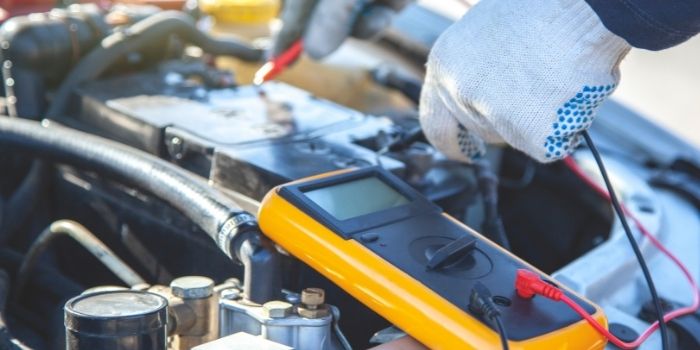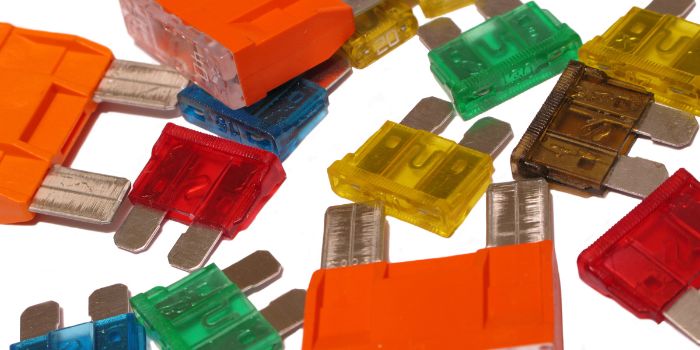
Understanding how to utilize a test light is a skill that will come in helpful at some moment.
A test light, also known as the main tester, test lamp, or voltage tester, is an electrical gadget that is used to check the existence of electricity in your vehicle’s circuits.
So, what’s the point of a test light?
Because an electrical system in a contemporary automobile has numerous components and is complicated in general, tracing down problems within it might be difficult.
Even so, most components may be tested with a simple test light.
Which is used before doing car repairs to perform electrical power and grounding tests.
It is simple to use, cheaply affordable, and widely accessible in most hardware and parts shops.
Table of Contents
Different Types of Test Lights
Understanding the various kinds of test lights is the first step toward understanding their utilization.
There are several types of test lights available, so understanding their roles allows you to choose the finest automobile test light for the job at hand.
Some are solely intended for simple tasks, but others are utilized for a variety of electrical purposes.
Here are some of the test lights that are currently available on the market.
1. Voltage Testers Without Contact
This kind of tester enables you to test for voltage without having to touch any of your vehicle’s electrical components.
It is battery-powered and very simple to operate.
2. Testers for Neon Voltage
This test light is only intended to detect the presence of electricity. It also necessitates touch with the components, therefore you must exercise caution while utilizing it.
3. Circuit testers that plug in
This gadget includes three neon lights that light up in various patterns, each indicating a distinct test result.
The meaning of the light patterns is simple to decipher.
4. Continuity Examiner
This battery-powered test light is ideal for detecting a variety of electrical issues. It also has an LED digital display that shows you information.
5. Multimeter
Multimeter vs. test light? Voltage is detected by both tools. It’s only that the multimeter is utilized for a variety of tasks.
It has a dial for adjusting the test function, and when used appropriately, the multimeter can provide a variety of information on various automobile components.
When you have a multimeter, you may not require as many test lights.
6. Voltage Tester for Solenoid
This is another test light that is intended to perform a variety of testing duties. It is not battery-powered and is also reasonably priced.
It shows the presence and amount of voltage by clicking or vibrating in response to the presence and amount of voltage.
7. Clamp Meter
This instrument may be used as a multimeter as well as a current sensor.
Despite its high price, this test light is simple to use and safe to use.
Tips for Using a Test Light Correctly
Knowing how to utilize a test light can assist you in detecting when critical electrical components have failed.
Because test lights may be used for a variety of purposes, we will describe how to utilize one in these instances.
Positive voltage examination
The first step is to ensure that the test light is operational. This would need to connect the test light to a known ground source.
A ground source in this context refers to exposed metal elements of the car’s chassis. You might also utilize the negative end of the battery.
Touch the probe gently to a source of positive voltage, such as a fuse or the positive terminal of a vehicle battery. If the test light illuminates, it is in excellent working order.
The next step is to go through the same procedure you used to test the test light.
The main difference is that after connecting to a ground source, you connect to the end of the wire or component being tested for positive voltage.
If the tool lights up, this indicates that there is some positive electricity present. If it doesn’t, the component has failed and has to be cleaned or replaced.
Using a test light to check fuses
You may use a test light to see whether any of your car’s fuses are energized. Here are the measures to take.
Locate the fuse box panel in your vehicle. You may need to consult the owner’s handbook to do this.
Once you’ve done so, remove the cover to reveal the fuses.
Before you begin, make sure the automobile is not turned on.
The test light’s clip is then clamped to a good ground source, such as a metal surface of the automobile that is not painted (like a bolt, for instance).
The battery’s negative terminal is likewise an excellent replacement. It all depends on where the fuse box panel is located in the vehicle.
The next step is to utilize the list of fuses on the inside of the cover to determine which fuse needs to be checked.
After that, place the probe of the test light into one of its holes to test it. The test light will illuminate if the fuse is operational. If it doesn’t, the fuse is most likely faulty.
You must validate this, and to do so, you must test the second hole on the fuse.
The power input and output of the fuse are represented by both holes.
If the test light does not illuminate after checking both holes, the fuse is most likely faulty and should be replaced.
Using a test light to look for a short to ground
You may have noticed that your automobile has started to lose power. If the issue remains after you have checked all other parts of its functioning, you should inspect the electrical system.
The goal is to determine the degree of electrical resistance, and the easiest method to do so is to inspect your vehicle’s ground circuit.
Here’s how you can do it.
Ascertain that the positive circuit is operational. After you’ve determined this, you may test the ground circuit.
Connect one end of the test light (ideally a circuit tester) to the positive end to do this.
The other end of the tester is then connected to the ground wire of the component being examined.
If the test light illuminates, the ground circuit is good, and you may need to look elsewhere to determine the source of the higher resistance.
What are the Best Automotive Circuit Testers to Buy?
Do you want to discover what’s wrong with your car’s charging system or ignition?
Or are you curious as to why your brake lights aren’t working?
These issues are most likely caused by a faulty connection in the car’s electrical system.
As a result, you’ll require a one-of-a-kind instrument to pinpoint the source of the problem.
Leaving you with a new problem, what is the best tool for the job? Relax. You don’t need any specialized equipment.
You just need to get a decent automotive circuit tester on the market.
1. IIT Professional 6-12V Circuit Tester
It is manufactured by IIT Corporation and is one of the greatest professional-grade tools available in the market today.
When the circuit is complete, a light in the handle lights.
Because of its adaptability, it may be used to find short circuits as well as test light sockets and fuses.
It includes a 4.5-foot ground wire as well as an excellent insulated alligator clip.
This gadget is ideal for detecting live and damaged wires.
The probe tip is protected by a plastic sheath on the device which prevents people from harming themselves when retrieving the instrument from the toolbox.
It’s perfect for use as a testing circuit in systems ranging from 6 to 12 volts.
Pros
- Circuit tester of the highest quality
- A lifetime warranty is included
- Extremely adaptable
- Excellent for preventative maintenance
Cons
- There are no instructions supplied
- The cord is only 4.5 feet long
2. OTC 3642 Truck Electrical Circuit Tester – 12V-24V with 24 Foot Cord
Need a test light with an extremely long cable, a huge clip, and that works on a 24-volt system?
Then this is the circuit tester that exceeds the standards we recommend for you.
It is intended for use on large vehicles such as trucks and buses because they often utilize a 12-24-volt system.
Aside from that, the rope may be extended to a length of 24 feet.
Furthermore, if the bulb breaks and falls out, you may buy a replacement.
If you need a high-performance 7-inch long probe circuit tester then this one is the best option.
Pros:
- Replaceable light bulb
- The light is excellent
- The cord is extremely long and coiled
- Excellent for truck use
Cons
- On the inside, the tester may melt
3. OEMTOOLS 25887 One Hand Wire Piercing Circuit Tester
This tool will appeal to you. It is really useful when dealing with wire testing.
All you have to do is puncture and let it hang up. As a result, both of your hands will be free.
That is not the total advantage.
This one may appear to be capable of drawing a large current, but it uses an LED that draws approximately 11 milliamps.
That figure will not do any harm. As a result, it’s computer-safe. The LED is also changeable.
There is no doubt about the brightness too.
It operates on a 6-24 volt system, making it suitable for a wide range of automobiles.
The suggested wire type is coiled flexible wire, which may reach a length of 12 feet which is long enough to get most of the workpieces.
Oemtools 25887 is a dependable heavy-duty gadget that can identify the circuit quickly and accurately.
Pros:
- Inexpensive
- Effective
- One-handed use
Cons:
- Red LED light is ineffective
4. JASTIND Heavy Duty Automotive Premium 6-24V Test Light
Long cords must take a long time to clean, don’t they? If you agree, this JASTIND circuit tester is an excellent choice.
When extended, the coiled cable may reach a length of 11.25 feet which is 135 inches.
This is an outstanding appropriate length for an automotive test light.
You may also use it to test most things, all thanks to its sharp piercing probe and handle.
The length of the tester is 8.5 inches, and the alligator clip is 3 inches. This facilitates one-handed operating.
This alligator clip may be used on both the negative and positive terminals.
This device is intended for testing systems ranging from 6 to 24 volts and you’ll also like the fact that this item comes with an indicator light for replacement.
Pros
- Long-lasting construction
- Excellent quality
- Simple to use
Cons
- For continuous testing, it may require a battery
5. Astro Pneumatic 7760 Cordless Circuit Tester
It is a lightning-fast circuit tester. It is cordless, so merely probe the workpiece or circuit to be tested, and it will light up and beep.
This is an excellent tool for testing technology in the inside automobile, such as the dash.
Unlike the other test lights, this one has an internal power supply (a typical AA battery). As a result, this one is usually computer-safe.
If you want the best circuit tester that is safe for airbags and ECM, this is the one for you.
It may be used for a variety of systems since it operates on a voltage range of 3 to 28 volts. You might think it’s pricey.
This one is reasonable, has a long-lasting battery, and is a must-have tool. It is also an economical choice for electricians and technicians.
Furthermore, the V-tip makes it simple to puncture the wire that has to be examined.
Pros:
- Excellent value
- Excellent quality
Cons:
- Imprecise
6. General Technologies Corp GTC CT8002 Cordless Circuit Tester
It is Astro’s direct opponent. They appear to have a similar design.
When the probe contacts the positive spot, it emits an LED light, an audio beep, and vibration. A V-tip is also intended for simple piercing.
This tester made in Canada consumes just 20 microamps of current and for the safety of your airbag and ECM, it’s highly recommended as this model is cordless.
It has a voltage range of 3 to 28 volts and deserves to be in your toolkit for a variety of applications. It may be carried in your pocket as needed.
This circuit tester is a rapid-issue solution for checking the live voltage without having to pull out your multimeter.
Pros:
- The cordless makes it easy to handle.
Cons:
- The accuracy isn’t fantastic
7. KZYEE KM10 Power Circuit Probe Kit
This instrument can do practically every service from continuity testing, ground checking, troubleshooting circuits, measuring MAX/MIN voltage, or even activating automobile components this product will take care of it for you.
Unlike many others, this accurately analyses resistance, diode, DC voltage, ad 12-24 volt systems’ AC voltage.
Even better, you only need to hit the mode button to do so.
You can quickly power it up and can reach practically every component of your trailer, truck, or automobile all thanks to its 20-foot cable.
The item is also equipped with a spotlight that lits around the working area.
Pros
- Equipped with plenty of functions
Cons
- You may require some expertise to better use it
What to Look for in an Automotive Circuit Tester when Buying?
They are also known as test lights. And you could easily diagnose all of your car’s electrical issues in no time with this tester.
However, with so many versions on the market, selecting the ideal product may be difficult.
Knowing that we have compiled a list of tips that will help you pick the right automotive circuit testers available online.
There’s no chance you won’t discover the ideal one for your needs here.
a) Length of the Cable
This is one of the most critical aspects to consider.
Long cables, as opposed to small ones, are preferable since they reach the majority of regions.
Long wires, on the other hand, have significant drawbacks.
For example, they take too much space and are difficult to clean.
We recommend purchasing circuit testers with coiled cables for ease of handling and storage.
b) Voltage range
Take into account the voltage of the automobile wiring and circuits you plan to examine.
This will allow you to select the best device for the job.
For example, if you have a hybrid vehicle with a 24V system, utilizing a 6-12 Volts unit will not be realistic.
However, we have one easy recommendation, get the most adaptable circuit tester with a wide range of voltage.
c) Safety
A good one should keep you safe from the current overload. It should have adequate insulation.
Look for variants that have rubberized sleeves which prevent you from coming into direct touch with electrical circuits.
d) Durability
Look for elements that ensure a long life. Begin with strong cables, high-quality construction, and a shutter-proof arrangement.
Warranties must also be viewed as evidence of quality.
e) Price
As you are aware, pricing does not necessarily represent product quality.
There is no reason to overpay for a product that does not provide any additional benefits or features.
So, in addition to pricing, examine the features, limits, and advantages of circuit testers. Only then will you obtain the most affordable product.
Conclusion
Test lights are very useful equipment to have in your toolbox. Knowing how to utilize a test light is an essential skill for anybody who owns or operates a car.
This is because it makes it simple to determine the car’s electrical system and its components.
Also, there are several types and brands of test lights on the market.
Because everyone’s tastes and preferences are different, we didn’t choose a single product to suit everyone.
Instead, we’ve compiled a detailed list of the top 7 best automotive circuit testers currently on the market.
So, feel free to look through the features, benefits, and drawbacks of each test light and then choose the one that best suits your needs.
Hopefully, with the above products and tips, the next time your automobile develops a defect, you should be able to utilize your test light to rule out some of the more unlikely sources of the issue.

Based in Orem (Utah) John Paterson graduated from Utah Valley University and has begun writing in 2009. He has a large wealth of experience in writing articles related to cars, automotive repair, wheels, cleaning/maintenance, and much more. He has also written instructional articles in a similar niche for a few online publications as well. Currently, he works as a mechanic in his personal garage shop where he loves serving his countrymen from his heart.




